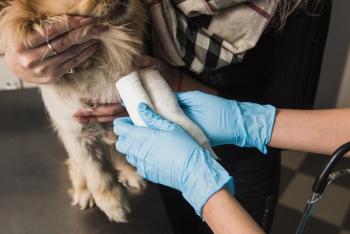
Rottweiler puppy receives lifesaving cod fish skin graft
Michigan State Universitys veterinary team calls Stellas case an inspiration, and believe her revolutionary skin grafts can change veterinary medicine as we know it.
After escaping a house fire, Stella had second- and third-degree burns covering 10% of her body, which the team at Michigan State University treated using cod skin to form skin grafts. (Image courtesy of Michigan State University)
When 1-year-old Stella escaped a burning house, she sustained enough damage to put her in an oxygen-saturated kennel for two weeks, according to a
“My dad's house caught on fire last Wednesday night while he wasn't home,” Madison Darmer writes on
A deeper look at cod skin grafts
According to the release, the use of Kerecis' fish skins for treatment on humans was marked as
In the release, Michigan State University (MSU) veterinarian and surgical resident Brea Sandness, DVM, BS, says Stella had second- and third-degree burns covering 10% of her body, with wounds across her head, nose, ears, hind end and sides. Because of her condition and the damage to her lungs, the Rottweiler puppy's veterinary team at MSU's Veterinary Medical Center wanted to avoid using anesthesia to treat her.
Luckily, Dr. Sandness recalled the
That problem was quickly solved, Dr. Sandness said in the release, when she found the Icelandic company Kerecis and, most importantly, their product Omega3 Wound. She was hooked. To make the find that much better, Omega3 Wound already had research and evidence backing descaled cod skin up, as well as an approval by the FDA.
The catch, of course, was that it had never been used on animals before. According to the release, Dr. Sandness was assured by the fact that there had been minimal complications in humans and decided to go for it.
The package of cod skins was shipped overnight, donated by Kerecis, and the grafting process began immediately. In the release, Dr. Sandness says that the grafts were easy to place on Stella's wounds. Ideally, the cod skins would be absorbed by her body as new tissue grew.
Dr. Sandness says in the release that not only did the cod skins absorb well, but they decreased Stella's pain, acted as anti-inflammatory aids and also worked as an anti-bacterial for several days.
“Stella's case is an inspiration,” Dr. Sandness says in the release, “and her grafts have the potential to be a new and highly-effective treatment tool in the veterinary profession.”
According to Stella's GoFundMe account, she's doing well and is slowly getting back to being a regular, happy puppy.
Everyone who isn't Stella, though, realizes she's no ordinary puppy-she's a fighter and a groundbreaker. “She's a living example that the fire within her burned stronger than the fire that injured her,” Dr. Sandness says in the release.
Newsletter
From exam room tips to practice management insights, get trusted veterinary news delivered straight to your inbox—subscribe to dvm360.





